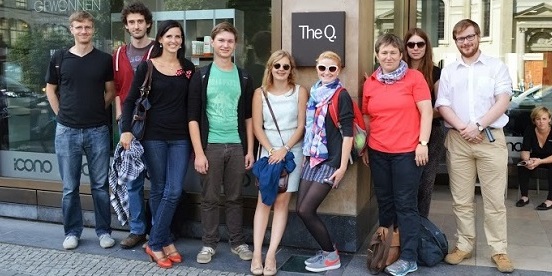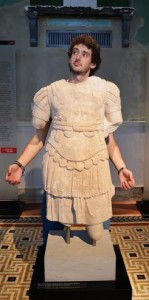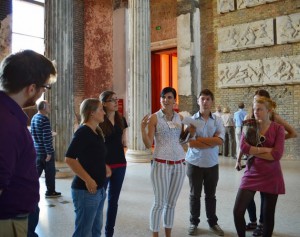
May 9, 2015, by Oliver Thomas
Q-Kolleg part 2
Following yesterday’s post on the most recent Q-Kolleg exchange, today Craig Goodere explains how the 2012/13 exchange has now resulted in the publication of a collection of essays by the participants.
Fresh Perspectives on Graeco-Roman Visual Culture (2015; ed. Klose, Bossert & Leveritt) is a brand new collection of papers written, presented and published by members of the 2012/13 session of Q-Kolleg – an international exchange programme run between the University of Nottingham’s Department of Classics and Humboldt-Universität zu Berlin’s Winckelmann-Institut für klassiche Archäologie.
As its title suggests, the work’s purpose is to bring forward fresh perspectives on the study and use of ancient Graeco-Roman art. Its nine articles – first presented at the 2013 Q-Kolleg conference in Berlin – reflect both the range of the students’ personal interests and the overall depth of their subject area – from the use of colour on ancient sculptures (Neuenfeld) to the artistic renderings of power (Engel and Martyndale-Howard) and more methodological questions of interpretation (Sporleder and Klose).
 The purposes of the Q-Kolleg programme is to promote the exchange of ideas between students from differing institutions and to introduce them to the concept of international collaboration. Each session lasts for exactly one academic year and centres upon two one-week-long student exchange visits, one based in Nottingham (around March) and one in Berlin (around September). Fortnightly meetings are held by each side throughout the year, in conjunction with bi-monthly video conferences between Nottingham and Berlin. The latter, in particular, help to provide the programme with a sense of structure and to facilitate a continuous flow of communication between the participants.
The purposes of the Q-Kolleg programme is to promote the exchange of ideas between students from differing institutions and to introduce them to the concept of international collaboration. Each session lasts for exactly one academic year and centres upon two one-week-long student exchange visits, one based in Nottingham (around March) and one in Berlin (around September). Fortnightly meetings are held by each side throughout the year, in conjunction with bi-monthly video conferences between Nottingham and Berlin. The latter, in particular, help to provide the programme with a sense of structure and to facilitate a continuous flow of communication between the participants.
For the first six months of the 2012/13 session, the entire group was provided with a single focus about which they could discuss and exchange ideas and approaches: the Elgin Marbles – the collection of Classical Greek marble sculptures from the Parthenon, now housed in the British Museum, London.
This decision to get all of the students to focus on a single topic right from the start was designed to get them thinking ‘outside the box’ – to become familiar with the range of approaches among their peers, to consider using alternative methods, and to develop their own particular style. Having brought these ideas to bear during the Nottingham visit, the students were then allowed to focus upon their individual areas of interest, in preparation for presenting a paper – on a subject of their own choosing – at a public conference held in Berlin. It was these which eventually culminated in the articles presented in Fresh Perspectives.
 The ideas presented in Fresh Perspectives are a testament to the work and commitment of their authors over the last two years. But they also show that, whatever the participants individually took away from the programme, they were able to overcome the obvious barriers of language, distance and being at varying stages of their academic careers, and to demonstrate the rich opportunities of international collaboration.
The ideas presented in Fresh Perspectives are a testament to the work and commitment of their authors over the last two years. But they also show that, whatever the participants individually took away from the programme, they were able to overcome the obvious barriers of language, distance and being at varying stages of their academic careers, and to demonstrate the rich opportunities of international collaboration.
All images provided by the author.

Check out Craig’s other recent blog-post for our friends at the Digital Humanities Centre – about a project he did during his Classics MA: https://blogs.nottingham.ac.uk/digitaldialogues/2015/05/11/digitising-the-lake-distict-the-maysons-project-by-dhc-volunteer-alumnus-craig-goodere/